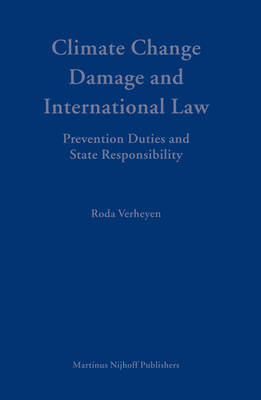
Door een staking bij bpost kan je online bestelling op dit moment iets langer onderweg zijn dan voorzien. Dringend iets nodig? Onze winkels ontvangen jou met open armen!
- Afhalen na 1 uur in een winkel met voorraad
- Gratis thuislevering in België vanaf € 30
- Ruim aanbod met 7 miljoen producten
Door een staking bij bpost kan je online bestelling op dit moment iets langer onderweg zijn dan voorzien. Dringend iets nodig? Onze winkels ontvangen jou met open armen!
- Afhalen na 1 uur in een winkel met voorraad
- Gratis thuislevering in België vanaf € 30
- Ruim aanbod met 7 miljoen producten
Zoeken
Climate Change Damage and International Law
Prevention Duties and State Responsibility
Roda Verheyen
€ 153,85
+ 307 punten
Omschrijving
This book is the first comprehensive assessment of the legal duties of states with regard to human induced climate change damage. By discussing the current state of climate science in the context of binding international law, it convincingly argues that compensation for such damage could indeed be recoverable.
The author analyses legal duties requiring states to prevent climate change damage, and discusses to what extent a breach of these duties will give rise to state responsibility (international liability). The analysis includes the UN Framework Convention on Climate Change and the Kyoto Protocol, but also various nature/ biodiversity protection and law of the sea instruments, as well as the no-harm-rule as a key provision of customary international law. The challenge in applying the different aspects of the law on state responsibility, including causation and standard of proof, are discussed in three case studies, and the questions raised by multiple polluters explored in depth. Against this background, the author advocates an internationally negotiated solution to the issue of climate change damage.
The author analyses legal duties requiring states to prevent climate change damage, and discusses to what extent a breach of these duties will give rise to state responsibility (international liability). The analysis includes the UN Framework Convention on Climate Change and the Kyoto Protocol, but also various nature/ biodiversity protection and law of the sea instruments, as well as the no-harm-rule as a key provision of customary international law. The challenge in applying the different aspects of the law on state responsibility, including causation and standard of proof, are discussed in three case studies, and the questions raised by multiple polluters explored in depth. Against this background, the author advocates an internationally negotiated solution to the issue of climate change damage.
Specificaties
Betrokkenen
- Auteur(s):
- Uitgeverij:
Inhoud
- Aantal bladzijden:
- 418
- Taal:
- Engels
- Reeks:
- Reeksnummer:
- nr. 54
Eigenschappen
- Productcode (EAN):
- 9789004146501
- Verschijningsdatum:
- 1/11/2005
- Uitvoering:
- Hardcover
- Formaat:
- Genaaid
- Afmetingen:
- 161 mm x 229 mm
- Gewicht:
- 861 g

Alleen bij Standaard Boekhandel
+ 307 punten op je klantenkaart van Standaard Boekhandel
Beoordelingen
We publiceren alleen reviews die voldoen aan de voorwaarden voor reviews. Bekijk onze voorwaarden voor reviews.











